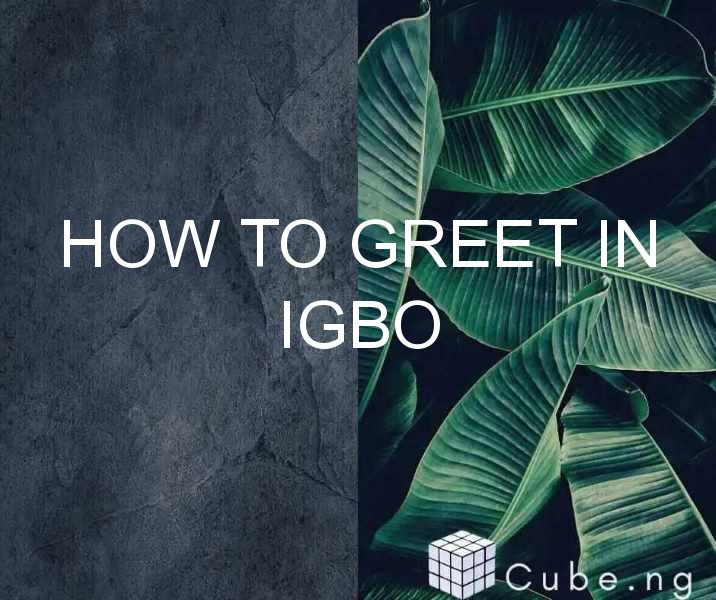Table of Contents
How to Greet in Igbo: A Comprehensive Guide
If you are looking to learn how to greet in Igbo, then you are in the right place. Igbo is one of the four main languages spoken in Nigeria, and it is a language that is rich in culture and tradition. In this article, we will take a comprehensive look at how to greet in Igbo, including the correct pronunciation, meaning, and context of different greetings.
What is Igbo Language?
Igbo is a language spoken by the Igbo people, who are one of the ethnic groups in Nigeria. The Igbo language is a tonal language, which means that the meaning of a word can change depending on the tone used to pronounce it. Igbo language has a total of 36 consonants and 8 vowels, making it a complex language to learn.
Why is Greeting Important in Igbo Culture?
In Igbo culture, greeting is a crucial aspect of social interaction. It is seen as a sign of respect and politeness. When you greet someone in Igbo, you are acknowledging their presence and showing them that you value them. Greetings are also used to establish a connection between people and to create a sense of community.
Basic Greetings in Igbo
Here are some of the basic greetings in Igbo that you can use to start a conversation and show respect:
1. Ndewo
Ndewo is the most common greeting in Igbo. It is used to say hello or welcome. The pronunciation is "n-deh-woh."
2. Kedu
Kedu means "how are you?" and it is used to inquire about someone's well-being. The pronunciation is "keh-doo."
3. Ka omesia
Ka omesia means "welcome" and it is used to greet someone who has just arrived. The pronunciation is "ka-oh-meh-see-ah."
4. Daalu
Daalu means "thank you" and it is used to express gratitude. The pronunciation is "dah-loo."
5. Maka odi mma
Maka odi mma means "because you are good" and it is used to show appreciation. The pronunciation is "mah-kah oh-dee mah."
Advanced Greetings in Igbo
Here are some advanced greetings in Igbo that you can use to show respect and establish a deeper connection:
1. Ndewo nu
Ndewo nu is a more formal greeting than Ndewo. It is used to show respect to someone who is older or in a higher position. The pronunciation is "n-deh-woh noo."
2. Kedu ka i di
Kedu ka i di means "how are you doing?" and it is used to inquire about someone's well-being in a more detailed manner. The pronunciation is "keh-doo kah ee-dee."
3. Maka odi nma
Maka odi nma means "because you are very good" and it is used to show deep appreciation. The pronunciation is "mah-kah oh-dee mah."
4. Nnọọ
Nnọọ is a greeting used to show respect to someone who is older or in a higher position. It is similar to "sir" or "ma'am" in English. The pronunciation is "nnoh-oh."
Conclusion
Greeting is an important aspect of Igbo culture, and it is essential to know how to greet properly to show respect and politeness. In this article, we have discussed some of the basic and advanced greetings in Igbo, including their pronunciation and context. By learning these greetings, you can start a conversation and establish a deeper connection with the Igbo people.
FAQs
Q1. What is the most common greeting in Igbo?
A1. The most common greeting in Igbo is Ndewo, which means hello or welcome.
Q2. How many consonants and vowels does the Igbo language have?
A2. The Igbo language has 36 consonants and 8 vowels.
Q3. Why is greeting important in Igbo culture?
A3. Greeting is important in Igbo culture because it is a sign of respect and politeness.
Q4. What is the difference between Ndewo and Ndewo nu?
A4. Ndewo nu is a more formal greeting used to show respect to someone who is older or in a higher position.
Q5. What is the correct pronunciation of Kedu?
A5. The correct pronunciation of Kedu is "keh-doo."




